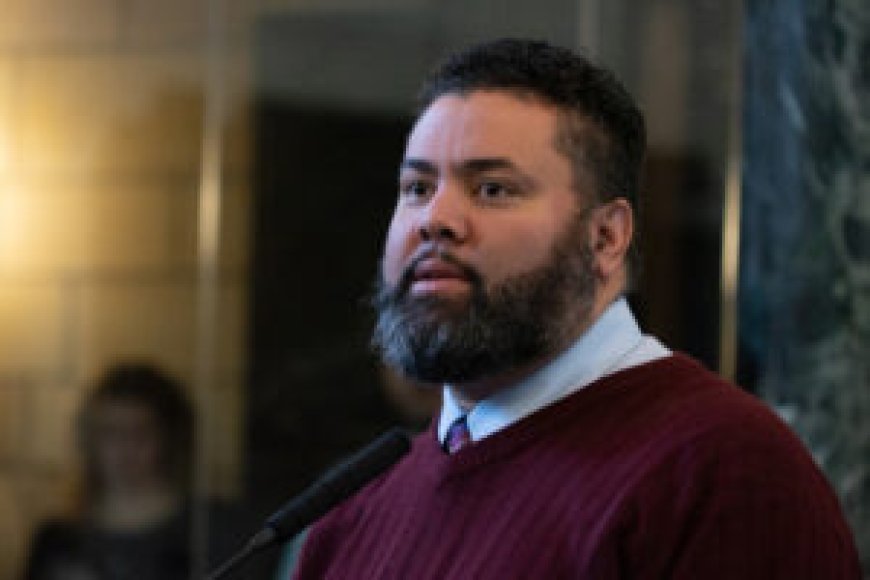Lawmakers seek to hold public schools, state employees liable for child sexual assault and abuse • Nebraska Examiner
Lawmakers seek to hold public schools, state employees liable for child sexual assault and abuse • Nebraska Examiner Nebraska Examiner

Officials in Nebraska Could Face Liability for Failing to Protect Children
Officials in public schools or other Nebraska political subdivisions could be held liable if they fail to protect children in their care through a proposal inching forward in the Legislature.

Legislative Bill 25
Legislative Bill 25, introduced by State Sen. Justin Wayne of Omaha, was the subject of multiple days of debate and negotiations that ultimately resulted in a replacement of Hastings State Sen. Steve Halloran’s LB 341 on Tuesday to become Wayne’s LB 25. The changes also leaned closer in some provisions involving legal liability to LB 325 from State Sen. George Dungan of Lincoln.
The amended LB 25 could allow lawsuits — in the case of child abuse or sexual assault of a child — against political subdivisions or their employees who have a duty to protect children against the crimes.
The harm must be a “proximate result” of the political subdivision’s failure or an employee’s failure to exercise “reasonable care” to care for a child in their care or custody.
“Nothing is going to make these individuals completely whole,” Wayne told the Nebraska Examiner after the votes. “We’re just trying to provide the best remedy we can under the law.”
Wayne offered the amendment, which was adopted 32-15. Lawmakers then voted to advance LB 25 on a 26-14 vote, with eight lawmakers “present, not voting.”
Opening ‘Pandora’s Box’
State Sen. Carolyn Bosn of Lincoln, a former prosecutor, led opposition to the measure, arguing that if school officials have knowledge of wrongdoing and fail to investigate, which is required under “reasonable care,” they can already be held accountable. She ultimately did not vote on LB 25 or any amendments.
Dungan and Wayne, who are also lawyers, disagreed that the law Bosn pointed to would be adequate.
Bosn said she negotiated on a possible amendment with State Sens. Ben Hansen of Blair and Mike Jacobson of North Platte, possibly to cap recovery damages at $500,000.

Jacobson said those conversations also included whether to limit the scope of the bill to K-12 schools or add options for victims beyond lawsuits. Bosn said she wanted support on the front end and not after a harm has occurred.
LB 25 could favor attorneys representing families or children who have been harmed, Jacobson argued, as lawyers would be looking for “deep pockets.”
“I’m just saying you’re opening up Pandora’s Box when you go this route,” Jacobson said.
Dungan said there may always be “ambulance chasers” seeking money, but he joined Wayne in stating that lawyers have an ethical duty not to file frivolous lawsuits and noted that judges can throw cases out if they determine the actions are frivolous.
Goals of ‘protecting children’
State Sens. Steve Erdman of Bayard and Julie Slama of Dunbar both criticized opponents to Wayne’s bill who have said they want to protect children but voted against Wayne’s bill.
Erdman, who often is closely aligned with Halloran, defended the effort as targeting schools that aren’t doing everything right. If they are, “they have nothing to fear.”
He said he couldn’t understand why LB 25 was controversial and that when he returns to his district in western Nebraska, he can say he did everything to protect Nebraska’s most vulnerable while some of his colleagues thought protecting the state was more important.
“When you vote, you will clarify to the voters, to the public, where you really stand on protecting children,” Erdman said.

| SDGs | Targets | Indicators |
|---|---|---|
| SDG 4: Quality Education | Target 4.1: By 2030, ensure that all girls and boys complete free, equitable, and quality primary and secondary education leading to relevant and effective learning outcomes. | Indicator 4.1.1: Proportion of children and young people (a) in grades 2/3; (b) at the end of primary; and (c) at the end of lower secondary achieving at least a minimum proficiency level in (i) reading and (ii) mathematics, by sex. |
| SDG 5: Gender Equality | Target 5.2: Eliminate all forms of violence against all women and girls in the public and private spheres, including trafficking and sexual and other types of exploitation. | Indicator 5.2.1: Proportion of ever-partnered women and girls aged 15 years and older subjected to physical, sexual, or psychological violence by a current or former intimate partner in the previous 12 months, by form of violence and by age group. |
Behold! This splendid article springs forth from the wellspring of knowledge, shaped by a wondrous proprietary AI technology that delved into a vast ocean of data, illuminating the path towards the Sustainable Development Goals. Remember that all rights are reserved by SDG Investors LLC, empowering us to champion progress together.
Source: nebraskaexaminer.com

Join us, as fellow seekers of change, on a transformative journey at https://sdgtalks.ai/welcome, where you can become a member and actively contribute to shaping a brighter future.







